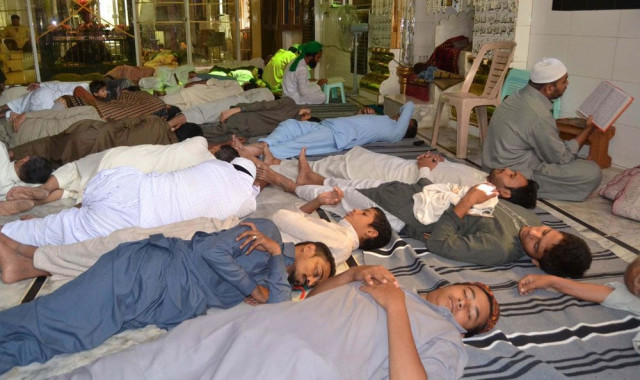Power outages hit Karachi as demand hits record high on sweltering first day of Ramazan
K-Electric using tight schedule of alternate outages to deal with gap between electricity supply and demand

Men rest during Fajr at a mosque on the first day of Ramazan in Karachi. PHOTO: INP
Read: To spare domestic consumers in Ramazan, industry must suffer
And while the first fast did fall on a Friday with most government and private offices packing up by noon, an unusual absence of winds that usually blow into the city from sea has apparently pushed residents to switch on every available fan and air conditioner, officials say.
"We are trying to cope up with the situation as best as we can," said Usama Qureshi, spokesperson for K-Electric. "This is the record power demand we have seen."
The power utility is using its tight schedule of alternate outages to deal with the gap between electricity supply and demand. But areas, which normally remained exempted from outages, were also facing breakdowns due to excess consumption, which was causing the system to trip.
Pakistan Meteorological Department's Karachi region Director S. Sarfaraz said the intensity of the heat wave has increased due to a blockage in the sea breeze flowing into Karachi.
"A low air pressure has developed in North Arabian Sea that has dragged all the air into itself," he said. "I have never witnessed this happening in the third week of June."
But, he insisted, no conclusion about change in climate pattern should be deduced from this one isolated case. "We would need to study the record and then come up with a proper assessment."
He went on to add Karachi might remain under the grip of a heat wave for the next three days.
Read: Power cuts in Karachi
Unbearable heat has also taken toll on people who had to venture out for work, said Edhi's Anwar Kazmi. "Our ambulances had to tend to few cases in Mehmodabad and Landhi areas."
The water crisis has added to the miseries of residents of the port city where many small and big towns are facing shortages.



















COMMENTS
Comments are moderated and generally will be posted if they are on-topic and not abusive.
For more information, please see our Comments FAQ